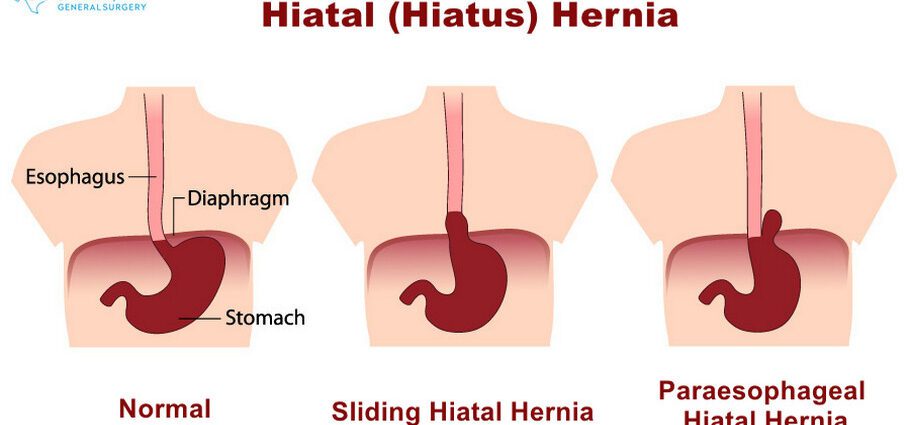Contents
Symptoms of hiatus hernia
Symptoms of hiatus hernia
Symptoms differ depending on the type of hiatal hernia. However, in many cases, the hernia does not cause symptoms because it is not a disease in itself, just an organ in bad position. It is sometimes diagnosed by chance, during a medical imaging test such as an endoscopy or an x-ray.
Slip hiatus hernia
It can sometimes cause or worsen gastroesophageal reflux disease (= heartburn), i.e. the rise of acidic juice from the stomach into the esophagus.
The symptoms are:
Symptoms of hiatus hernia: understand everything in 2 min
- Burning sensations that go up along the esophagus (acid reflux),
- A bad taste in the mouth
- A recurring cough
- Sore throat or hoarseness.
Left untreated, acidic juices can eventually irritate the lining of the esophagus, causing esophagitis, even ulcers (= small wounds).
Note : Some studies have shown that half of people with gastric reflux at least once a week, and three-quarters of those with reflux as well as esophagitis, have a hiatus hernia.2. However, these two entities are not synonymous: hiatus hernia is not systematically associated with reflux, and conversely, reflux is not always linked to a hiatus hernia. |
Hernie hiatale paraoesophagienne
It does not cause heartburn. Very often, it does not cause any symptoms or only intermittent discomfort.
When there is, the most common symptoms are:
- Chest or stomach pain, such as stomach cramps
- A feeling of heaviness and bloating after meals giving the impression of having eaten too much
- Breathlessness, which is shortness of breath caused by the stomach compressing the lungs
- Anemia caused by minimal but continuous bleeding
In rare cases, the incorrectly positioned stomach twists which can cut off the blood flow to the organ and cause tissue to die. This causes severe pain, vomiting, and urgent surgery is required as severe digestive bleeding can occur.
People at risk and risk factors
People at risk
Hiatus hernia is more common in Western countries and in people over the age of 50. Women are also more prone to this type of problem than men, possibly due to the pressure exerted on the abdomen during pregnancy.
Risk factors
Apart from age, certain factors seem to increase the risk of hiatus hernia:
- overweight or obesity,
- the pregnancy,
- smoking,
- chronic cough, which increases pressure in the abdomen.
Paraesophageal hiatus hernias are more common in people who have had surgery to reduce gastroesophageal reflux disease, or any other procedure affecting the esophagus or stomach3.










